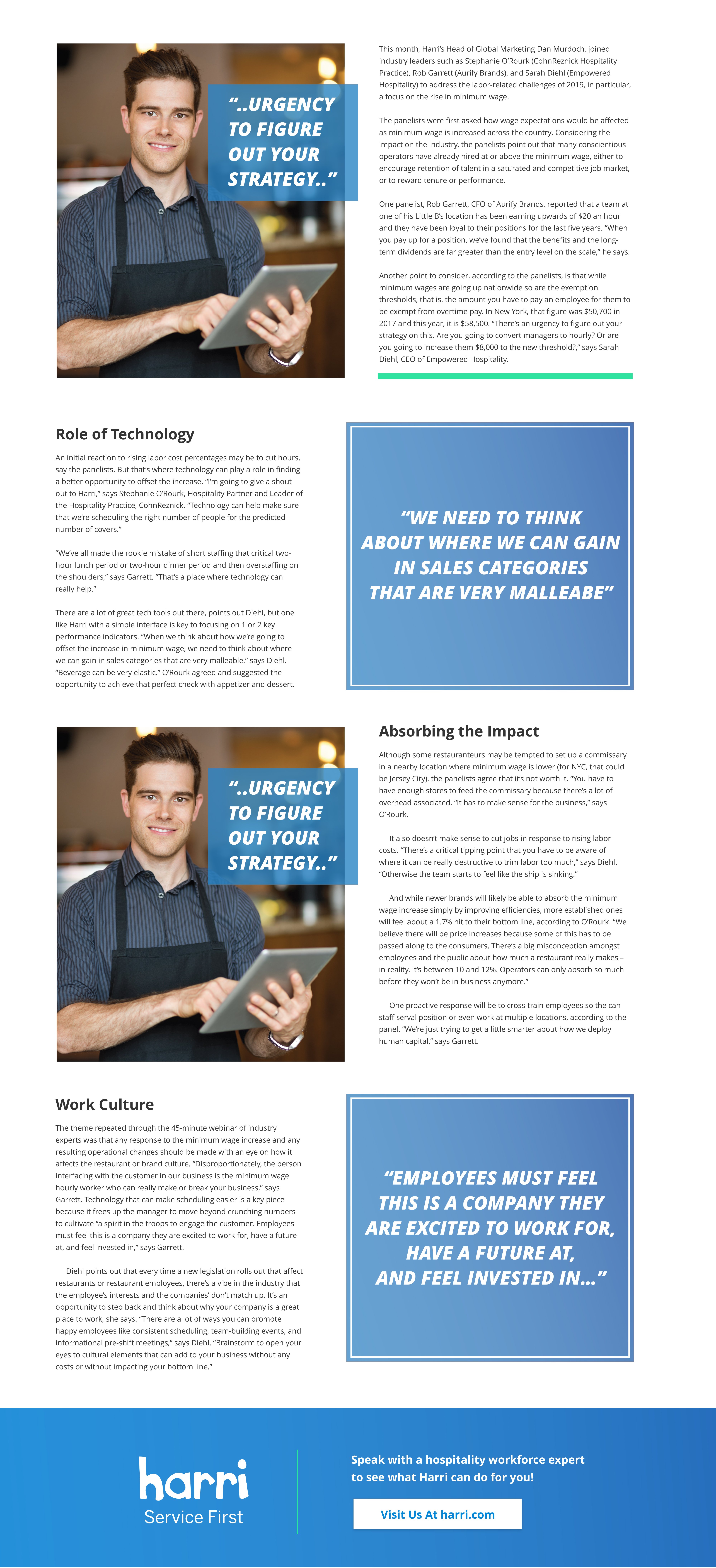
Moderator Sarah Lockyer, editor at Nation’s Restaurant News, first asked the panel to identify blind spots that the restaurant industry is facing currently. Kefauver pointed out that as legislations are enacted on the federal, state and local levels, restaurants no longer have the kinds of allies it once did in city hall or with other businesses. In addition to what he calls this “political isolation,” another blind spot is that in the restaurant industry, there is a growing divide between the leadership and workforce in terms of diversity and background.
Halen pointed to the success of chains such as Shake Shack and Chipotle that are attracting talent and performing better than competitors because of their public commitment to doing right by the planet and the population.
Facilitate Reporting
Fryer emphasized the correlation of employee and guest experience, concluding that an operation needs stable teams to provide consistent product, service, and brand experience. To that end, operations need to calculate how much employee turnover is actually costing them – in a limited service establishment, it’s likely between 17 and 22 percent of total labor costs. You also must identify the main reason people leave, which in a lot of cases happens when expectations of scheduling don’t match the reality, according to Fryer.
Predictive scheduling and fair workweek laws are big challenges, the panelists agreed, and it’s going to get rough before it gets better. Kefauver said Chipotle just got heavily penalized by New York City’s new law, and that while local regulations really vary, industry leaders were able to contribute to Oregon’s new scheduling law and that it’s close to ideal. Fryer pointed out that 22 jurisdictions now have such laws, which are basically “ATMs for the labor department” because they are hard to be in compliance with but easy to enforce. The silver lining, according to Fryer, is that the laws are forcing multi-unit operators to think about how they manage labor more effectively across multiple units in a condensed geographic area.
An audience member then asked what can be done to prevent employees from taking advantage of predictive scheduling laws, which permit them to make last minute changes to their own schedules. Fryer suggested that the right technology, one that facilitates employee-led shift swaps and maintains a record, will help. Zaller agreed that when he’s defending a case, it’s always best to have a digital personnel file, which is less likely to be missing important documents.
Halen pointed to the other ways that technology is giving good return on investment in restaurants that have always been plagued by labor costs. Kiosks for ordering are replacing how much labor is needed, and handheld devices mean servers can cover more tables more efficiently. Fryer interjected that tech solutions are even more effective at the manager level. He suggested operations departments ask their managers to periodically do an audit of how much time they spend on tasks to uncover exactly where tech is needed.
Evers backed up how important those initial three months are on the job. “If we can get a person to celebrate their 91st day at the job, they are nearly 70% more likely to celebrate their one-year anniversary so it's a real opportunity,” he explained.
Technology Moved the Industry Ahead
Pre and Post-Hire Process
Another audience member asked the panel how a business can actually address these challenges to become an employer of choice and rise above what the rest is doing. Halen pointed out that chains do have the advantage of scale because they can pay for college for thousands of managers or give bonuses to millions without blinking an eye. Fryer said he believes the key is when operations genuinely link employee performance and business performance.
“I think that the impact technology's having on restaurant experience really puts the focus back on the quality of the experience being delivered by our employees,” says Fryer. “And the more we invest on time and resources into building our people, the better we grow.”
"Good turnover is a healthy part of what we do, and we try to address that from day one..."


"Everybody needs to still engage and communicate with your employees, with your vendors, with the politicians and get in front of the issues within the industry."




"the more we invest on time and resources into building our people, the better we grow."
“If we can get a person to celebrate their 91st day at the job, they are nearly 70% more likely to celebrate their one-year anniversary so it's a real opportunity”
State of the Union
Harri’s founder and CEO Luke Fryer recently appeared on a panel with industry leaders to discuss the unprecedented number of labor-related challenges in 2019. The panelists, which included Joe Kefauver, managing partner at Align Public Strategies; Mike Halen, senior analyst at Bloomberg; and Anthony Zaller, founding partner at Zaller Law Group, exchanged ideas on predictive scheduling, employee turnover, fair workweek, and tech solutions.


Service First

Speak with a hospitality workforce expert to see what Harri can do for you!
LEARN MORE ABOUT HARRI
WATCH THE WEBINAR

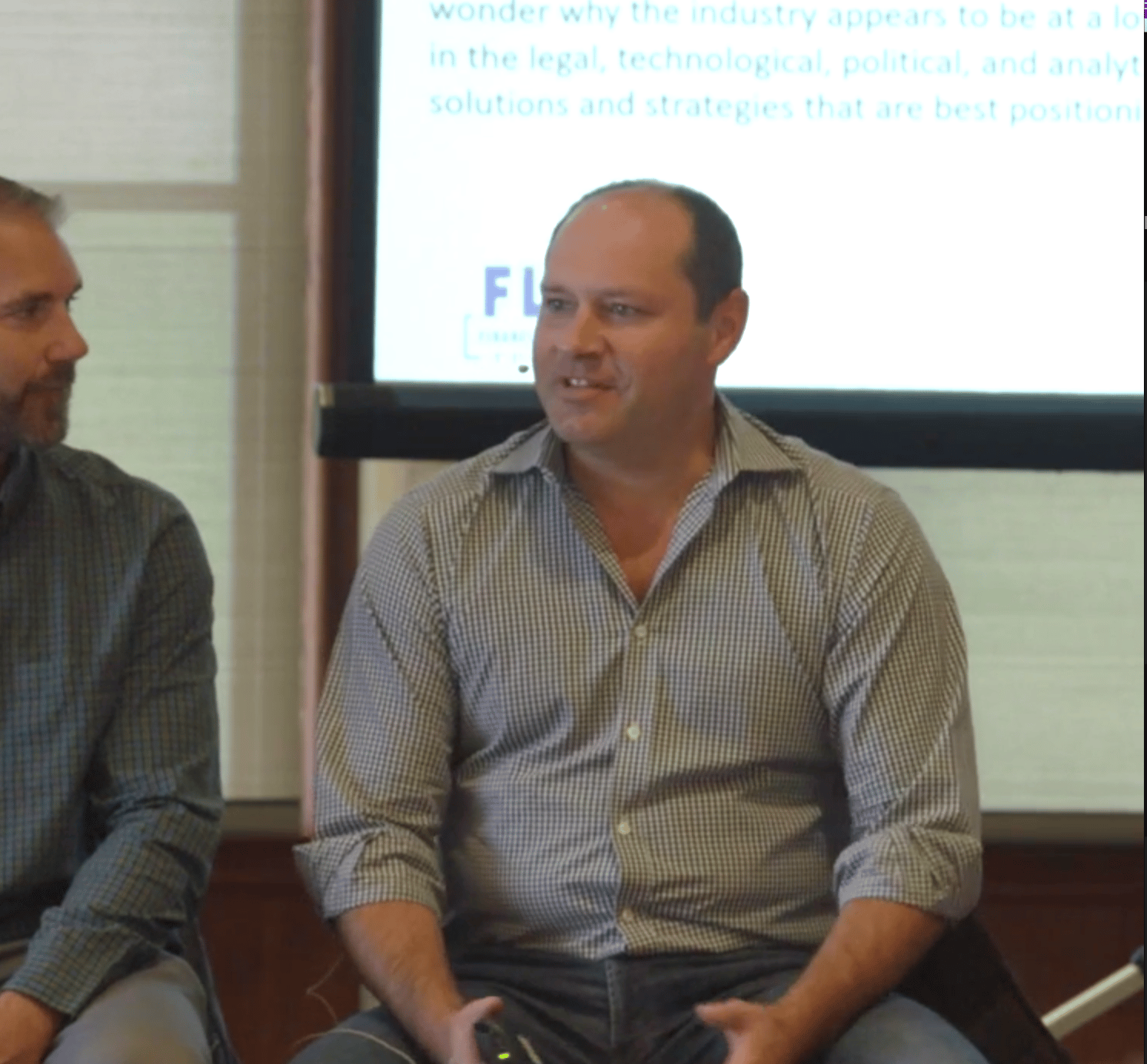
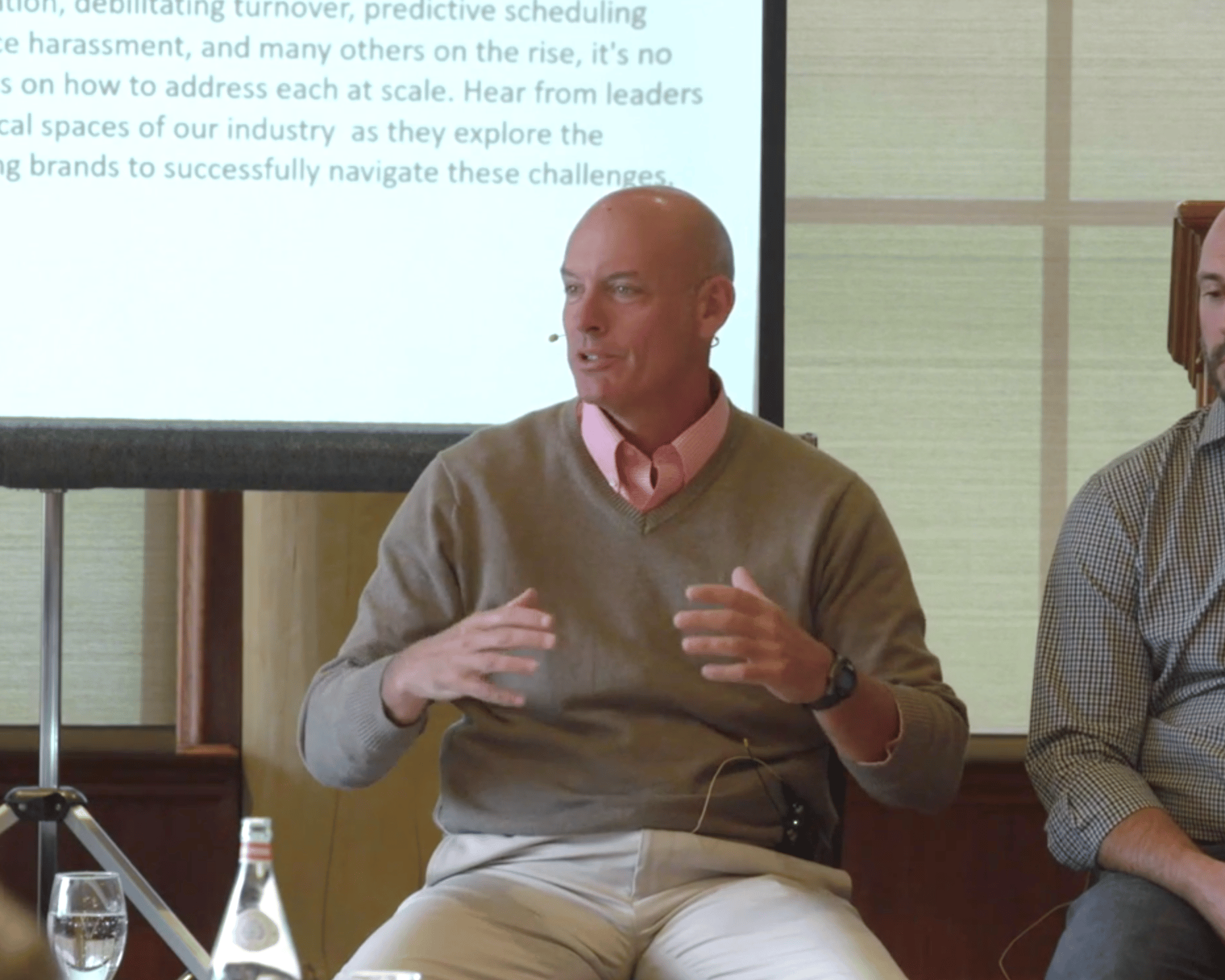


WATCH WEBINAR


Industry Challenges
When it comes to work culture, panelists agreed it’s better to introduce that culture to the candidate in the application process instead of after they are hired. “Your career page should resemble your culture, use the same buzzwords, and speak the same language,” added McMann-Oliveri. “Include a mission statement, core values, and steps of service, etc.”
Many panelists also noted that there’s a lot more emphasis on finding employees with the right life outlook and mindset – two things that are not trainable. “Attracting people with similar values when it comes to sustainability, the serving of your food, healthier food, better food – it not only attracts customers but also employees that want to be associated with your brand,” said Kilroy.
An Industry in Transition




"It’s important to let them know what they can expect next..."
WEBINAR RECAP
State of The Union
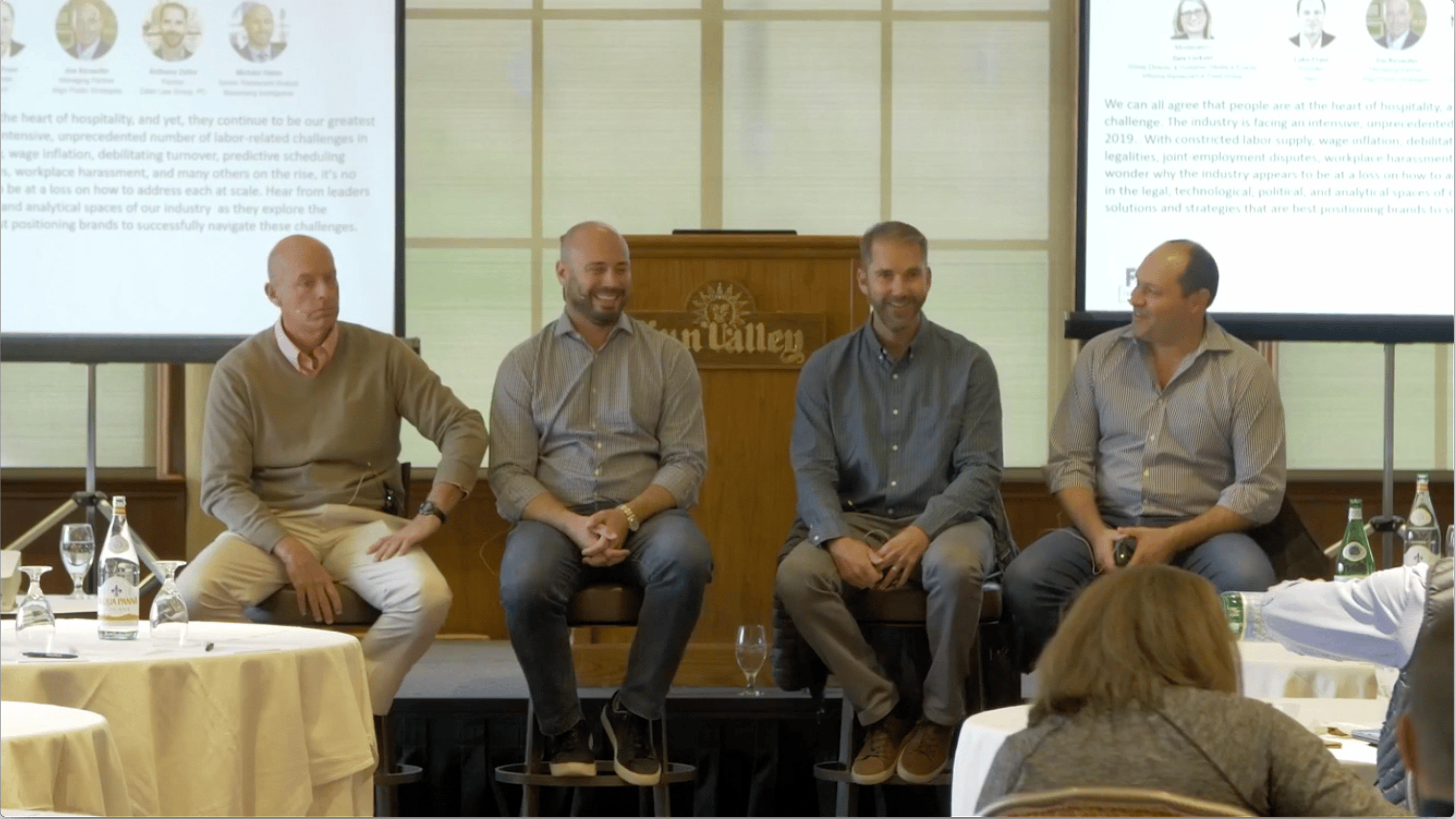
At Starbucks, for example, Halen said they started to use a data-driven inventory management system that handles ordering and purchasing. “It's taking one of the major duties of the GMs off of their plate, giving them more time to actually touch the guests,” he said.
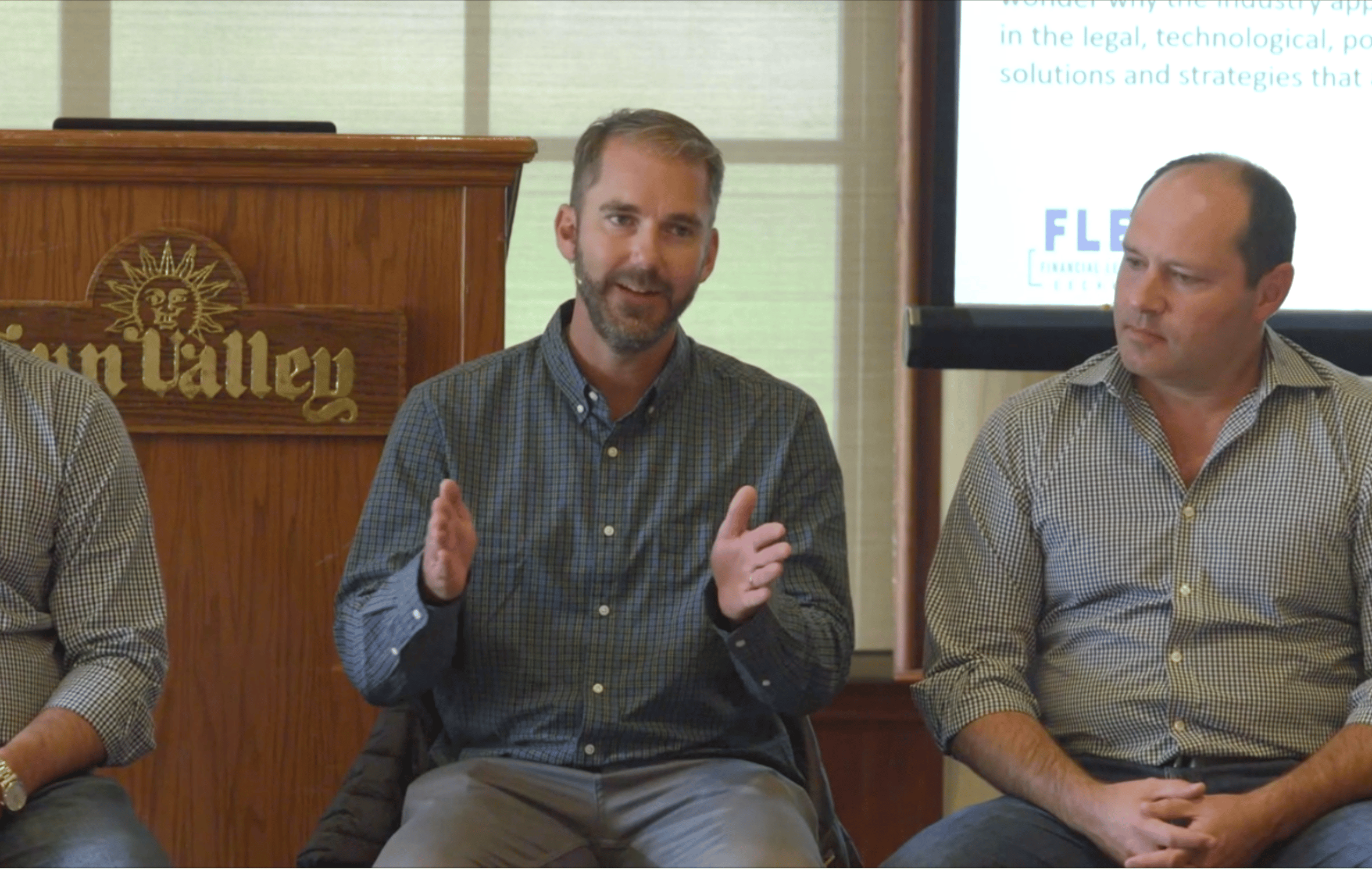
“In HR, we're so bombarded by all of these administrative tasks,” noted Evers. “Technology, for me, is where the real opportunity lies in taking over some of those tasks, enabling you to truly be a resource for humans in front of you.”
Ultimately, technology is poised to help those in the hospitality industry improve turnover rates. “With tech tools, we're able to look back on our historical information and make better decisions about the future,” said Birkenhead. What’s more, technology can help automate tedious tasks like inventory, freeing up managers to spend more of their time building relationships and engaging with staff.
Role of Technology




"I view turnover as a lagging indicator or poor engagement..."
"Your career page should resemble your culture, use the same buzzwords, and speak the same language"
Other panelists said they’ve seen hospitality companies offer bonuses, paid parental leave, training class on topics like wine, mental health benefits, and even offer employees’ kids a backpack full of school supplies in the fall.
As it’s impossible for most hospitality businesses to offer the highest wages to stay competitive in keeping employees, the panelists suggested thinking outside of the box with what they can offer. “It's so impactful when you sit down with somebody and ask them, ‘Outside of getting money from working here, what do you hope to achieve in general over the next 6, 12, 18 months? Let's write it down. I'll be transparent with you and let you know where we can support you and where we can't and then we can both make a well-informed decision on whether or not we join forces,” said Evers.
More than Money
Another part of early retention, according to the panelists, is maintaining communication so that candidates and new hires don’t feel like they’ve fallen off the radar. “It’s important to let them know what they can expect next, when they can expect to hear from us and ultimately, if it's not a right fit, we always let them know,” said Birkenhead.
To begin, the panelists discussed why the issue of turnover is so important in the hospitality industry. “Consider that on average, for one $11/hour employee, we're looking at a replacement cost anywhere between $2,000 and $5,000,” says Kilroy. He then added that as the restaurant industry has a low profit margin rate in general, employee turnover should be seen as an opportunity to generate more revenue, more profit or even just to catch up.
Another panelist mentioned that high turnover could be a signal of how operations are going. “I view turnover as a lagging indicator or poor engagement – it’s a metric to ascertain what's going on inside of your business and how to strategize accurately with your people,” says Birkenhead.
Likewise, McMann-Oliveri mentioned she’s spent a lot of time training managers at Bold on how to conduct interviews to filter out applicants early in the process. She said managers have to be encouraged to ask tough questions like are they legally able to work in the U.S. or can they work nights and weekends. “I think it's really getting your managers comfortable with getting to know people and saying no when it doesn’t look like a good fit,” she explained.

"If a post on social media or a video impacts another employee's ability to do their job, then that could be harassment"




"it’s a human right to have a safe and comfortable work environment"

Exploring 2019's Labor Related Challenges
Law and Order
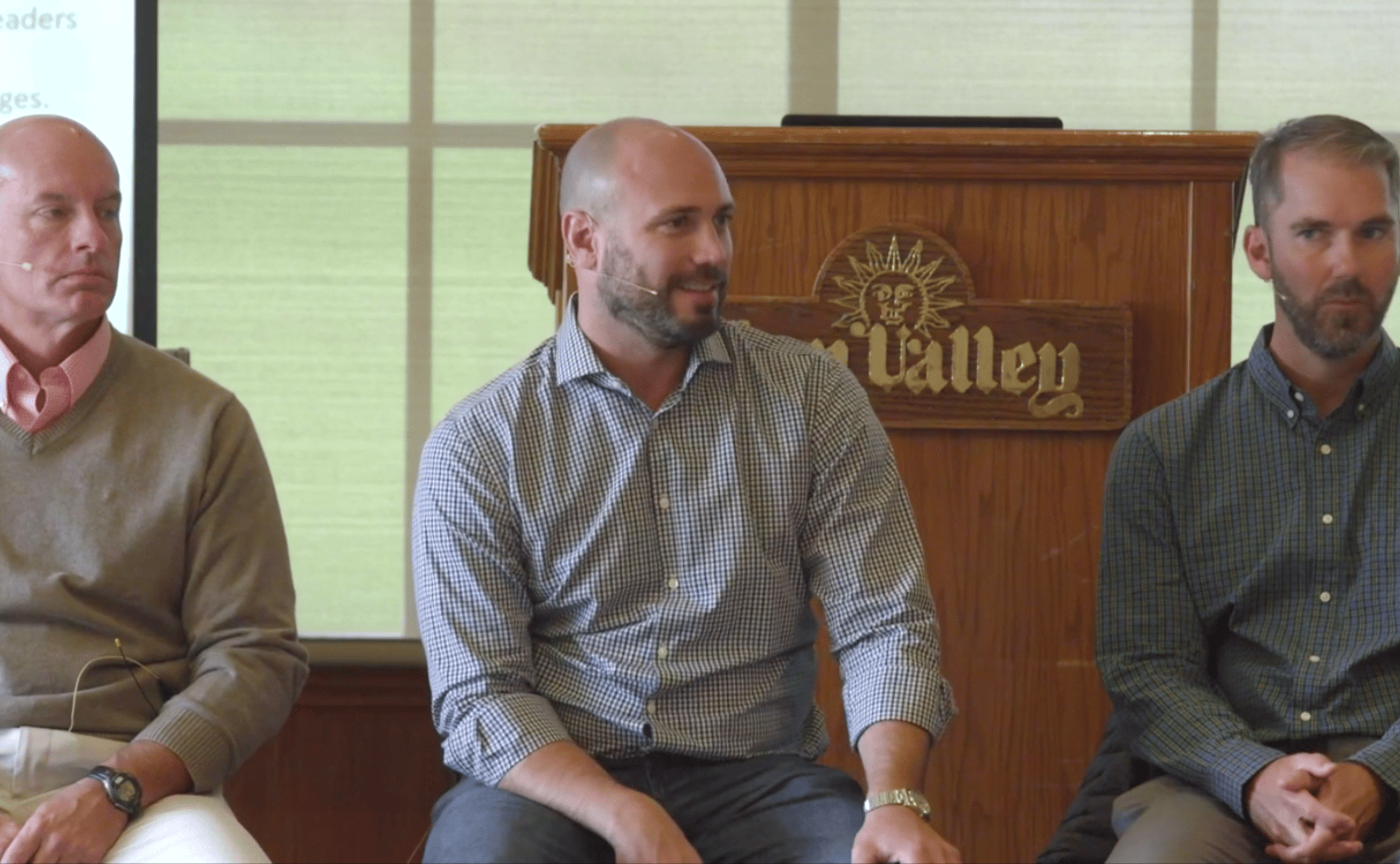


"Good turnover is a healthy part of what we do, and we try to address that from day one..."
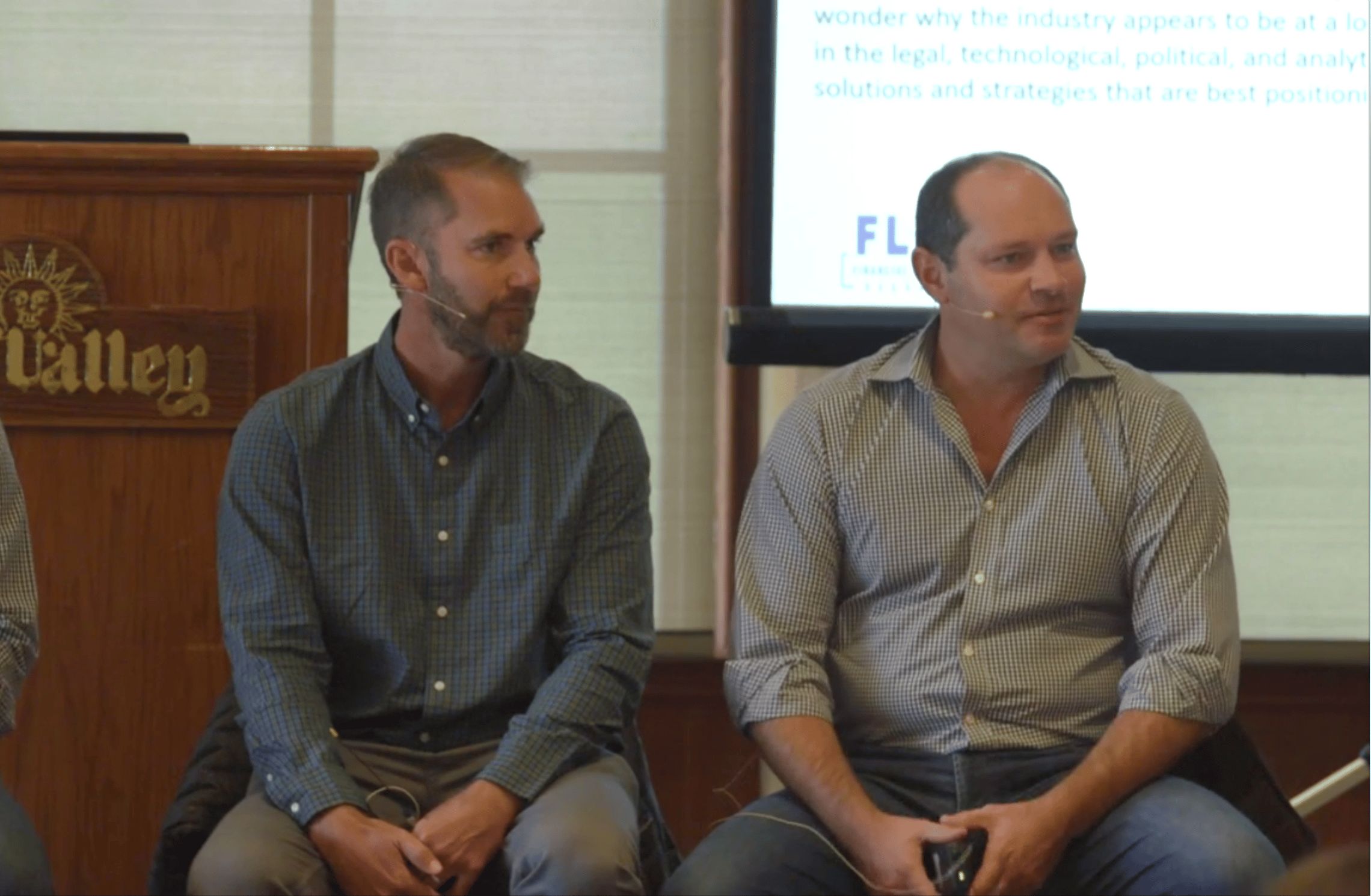
Exploring 2019's Labor Related Challenges
At Starbucks, for example, Halen said they started to use a data-driven inventory management system that handles ordering and purchasing. “It's taking one of the major duties of the GMs off of their plate, giving them more time to actually touch the guests,” he said.

